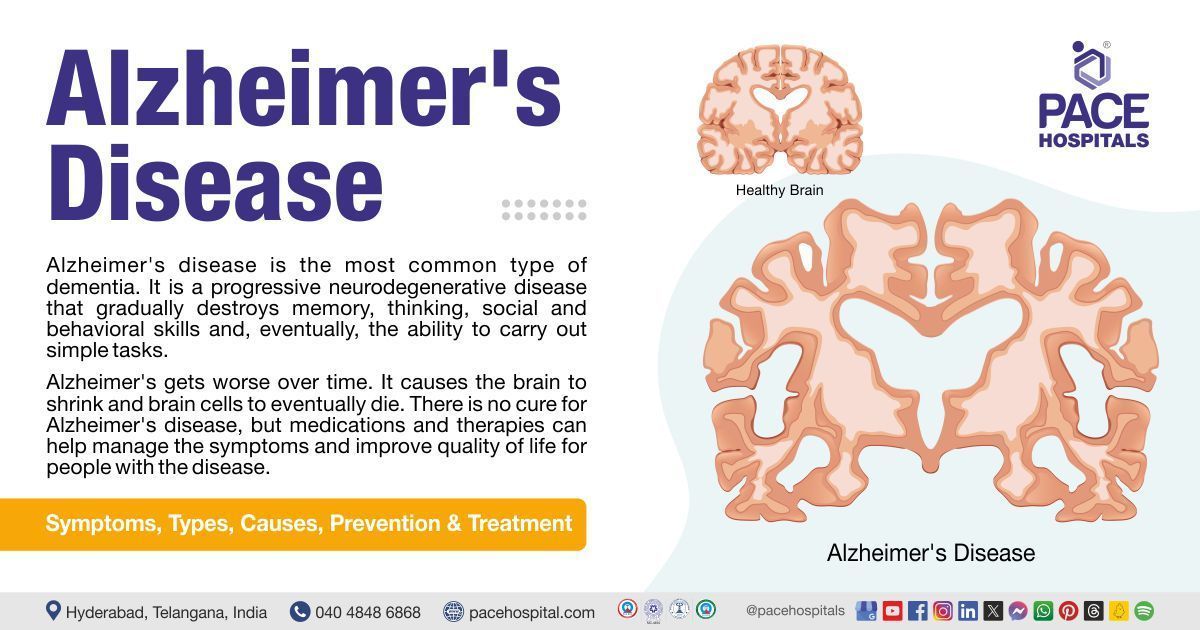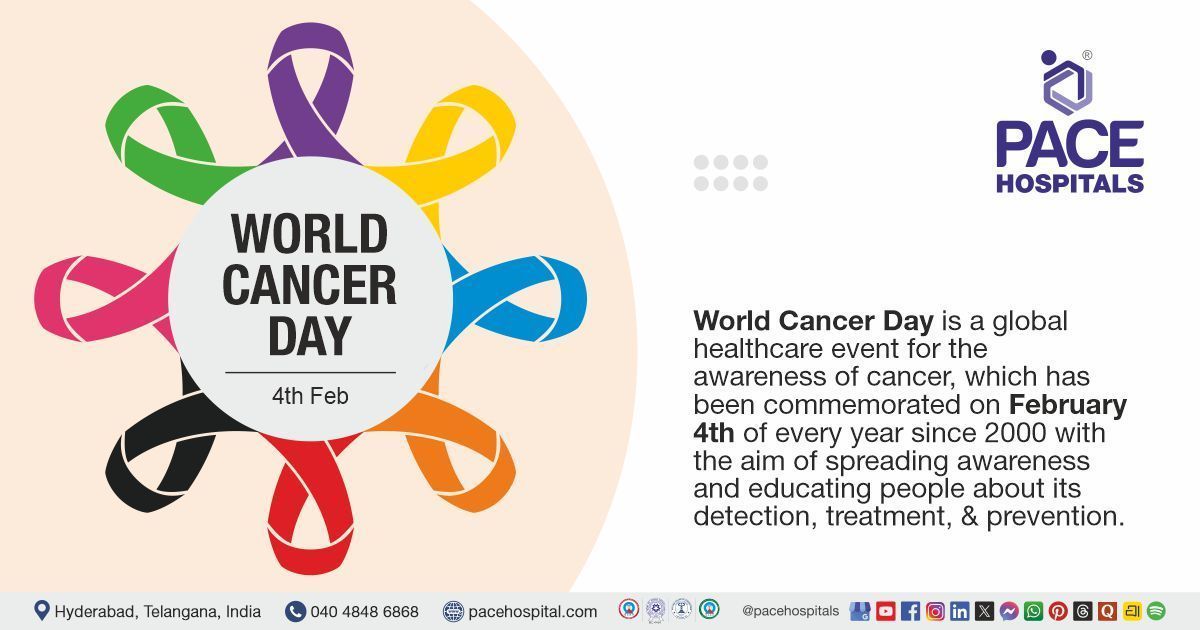Alzheimer's Disease - Symptoms, Types, Causes, Prevention and Treatment
Pace Hospitals
Alzheimer’s disease definition
Alzheimer's disease is a chronic neurodegenerative disease in which memory and thinking skills are slowly destroyed, affecting the ability to carry out the simplest tasks. A progressive impairment of behavioural and cognitive functions like memory, language, comprehension, reasoning, attention, and judgment are the hallmarks of the disease. It is the most frequent dementia type, comprising at least two-thirds of dementia cases in people aged 65 and older. It is also a sporadic and genetic neurodegenerative disease that causes cognitive impairment.
The medial temporal lobe and associative neocortical structures in the brain are primarily affected in Alzheimer's disease (AD). Both, intracellular neurofibrillary tangles and extracellular amyloid plaques are the two major pathological hallmarks in the brains of AD patients.
Brain parts that control memory, thought, and language are involved in Alzheimer's disease. It begins with mild memory loss and finally losing the ability to continue the conversation and respond to the environment. Alzheimer's disease can seriously affect people in carrying out their daily activities. At present, there is no cure for Alzheimer's disease, but the available treatments can improve some of the symptoms.
Alzheimer’s disease meaning
Alzheimer’s is a brain disorder in which memory and thinking skills are slowly destroyed, affecting the ability to carry out the simplest tasks.
Alzheimer's disease is named after the person who discovered it - Dr. Alois Alzheimer. In the year 1906, Dr. Alzheimer saw changes in a woman's brain tissue, who had died because of an unusual mental illness with symptoms like memory loss, language problems, and unpredictable behaviour. After she died, an examination of her brain was done and found many abnormal clumps (now called amyloid plaques) and tangled bundles of fibres (now called tangles, neurofibrillary, or tau).
Prevalence of Alzheimer’s disease
The number of people living with the disease double every 5 years beyond the age of 65. By 2060, the figure is expected to three times to 1.4crore people.
Prevalence in India
According to the Global Burden of Disease Study (GBDS) 2019, in almost 3 decades (1990-2019) the contribution of noncommunicable neurological disorders (including Alzheimer’s Disease) and injury-related neurological disorders to the total neurological disease burden has increased more than twice in India while the incidence of communicable neurological disorders has decreased by three quarters.
Nearly 0.368 crore active cases of Alzheimer’s disease were estimated in India in 2019. The prevalence rate for Alzheimer’s disease in India was reported to be 4.3%. Females demonstrated a higher proportion of disease burden. Andhra Pradesh, Kerala, Goa, Tamil Nadu states vary in their prevalence of Alzheimer’s disease. However, according to the CSIR report, it is worth mentioning that the above projections for India have been made via extrapolation of available inadequate data and as such no detailed epidemiological studies were done to find out the prevalence of Alzheimer’s disease in India.
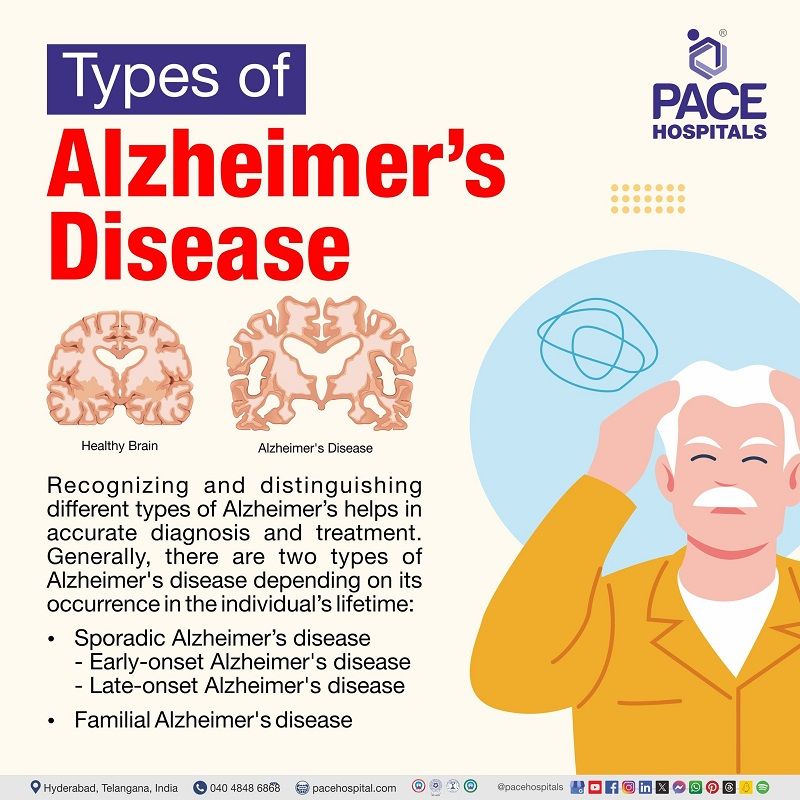
Types of Alzheimer’s disease
Recognizing and distinguishing different types of Alzheimer’s helps in accurate diagnosis and treatment, which is essential for healthcare professionals. Generally, there are two types of Alzheimer's disease depending on its occurrence in the individual’s lifetime:
- Sporadic Alzheimer’s disease
- Familial Alzheimer's disease
Sporadic Alzheimer’s disease: It is of two types:
- Early-onset Alzheimer's disease
- Late-onset Alzheimer's disease
- Early-onset Alzheimer's disease: Less than 10% of all people with Alzheimer's are early-onset type, and it occurs in people who are younger than 65 years old, and particularly between a person's 30s and mid 60s.Some cases are caused by an inherited change in one of 3 (three) genes. In other cases, research shows that other genetic components are involved. Patients suffering from Down syndrome are at a higher risk of developing this type of Alzheimer's disease.
- Late-onset Alzheimer's disease: The majority of Alzheimer's patients have late-onset Alzheimer's disease, which manifests symptoms in their mid-60s in those 65 and older. The researchers discovered an elevated risk by inheriting one version, or allele, of the apolipoprotein E (APOE) gene on the 19th chromosome, despite the lack of a specific gene that causes the late-onset form of the disease. People who have APOE ɛ4 are more likely to get the disease.
Familial Alzheimer's disease:
(FAD) is the other type of Alzheimer's disease and comprises less than 1% of all cases of Alzheimer's. Most people having early onset Alzheimer's may have familial Alzheimer's disease. In families having Alzheimer's people of at least two generations have had the disease.
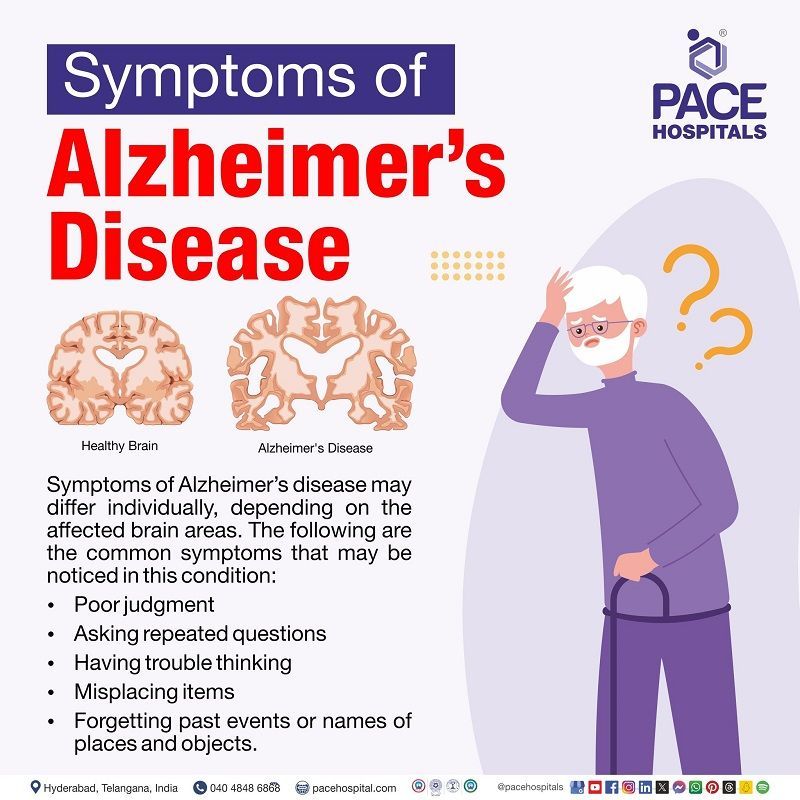
Alzheimer’s disease symptoms
It may be hard to notice the signs and symptoms of Alzheimer's in the early stages, as they progress slowly over several years, and sometimes they may be confused with other conditions. Symptoms may change from one person to another, depending on the affected brain areas which are as follows:
Early symptoms of Alzheimer’s disease include:
- Poor judgment
- Asking repeated questions
- Having trouble thinking
- Misplacing items
- Forgetting past events or names of places and objects.
Middle-stage symptoms include:
- Obsessive, repetitive behaviour
- Increased confusion and disorientation
- Disturbed sleep
- Difficulty in speech
- Delusions (beliefs based on an inaccurate interpretation of reality)
- Mood changes.
Later stage symptoms include:
(also known as last stage of Alzheimer's disease symptoms)
- Dysphagia (difficulty in swallowing)
- Difficulty in moving around without support.
- Weight loss
- Urinary incontinence (unintentional passing of urine)
The other common symptoms of Alzheimer’s disease are:
- Losing interest in daily activities and hobbies.
- Becoming less able to adapt to change.
- Repeating themself more or losing interest in the conversation
- Losing interest in trying new things
- Having difficulty shopping or preparing meals
- Becoming lost when away from known surroundings.
- Difficulty taking care of money.
Symptoms may worsen in conditions like stress, tiredness, and illness. Loss of memory and difficulty finding the right words for everyday things are the first symptoms of Alzheimer's disease but, in some cases, people with memory loss may not have Alzheimer's disease.
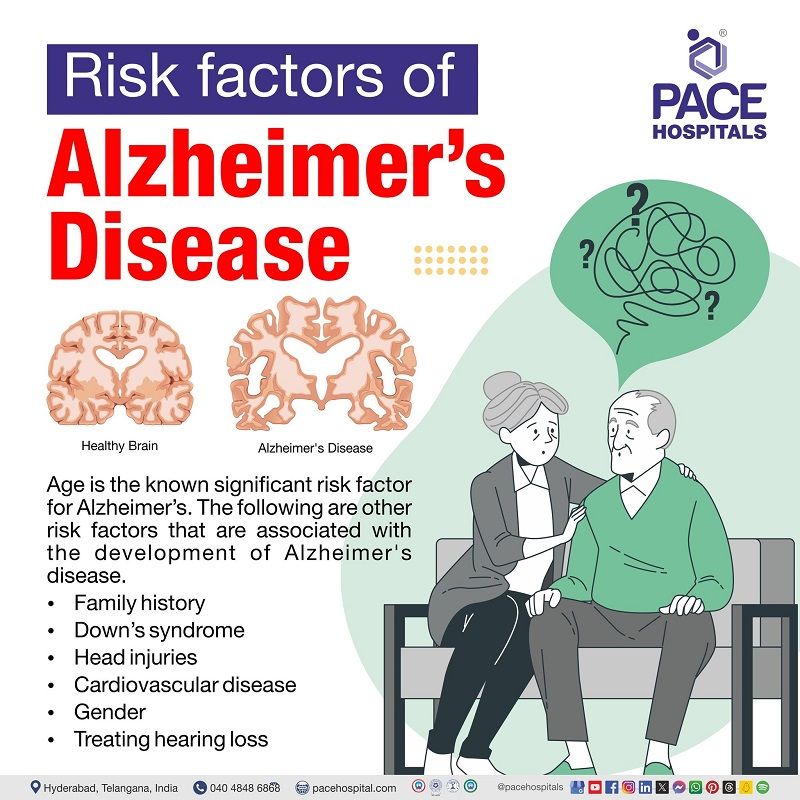
Risk factors for Alzheimer’s disease
Age is the known significant risk factor for Alzheimer’s. Several other factors may also contribute to increasing the risk of Alzheimer's disease. The following are some of the risk factors that are associated with the development of Alzheimer's disease:
- Family history: Hereditary genes involved in the family may also cause Alzheimer's disease. The risk of developing Alzheimer's may be increased by the genes which are inherited from parents.
- Down’s syndrome: The genetic changes causing Down’s syndrome can cause a buildup of amyloid plaques in the brain, leading to the occurrence of Alzheimer's disease.
- Head injuries: Alzheimer's may develop in people with head injuries.
- Cardiovascular disease: Several factors like diabetes (high blood sugar), hypertension (high blood pressure), smoking, obesity, and high cholesterol levels may increase the chance of developing Alzheimer's.
- Gender: Women are more affected with Alzheimer's than men.
- Treating hearing loss: The risk of Alzheimer’s increases in hearing loss patients; hence, it must be treated.
- Other medical conditions: Untreated depression, hearing loss, loneliness, and a sedentary lifestyle may also increase the chance of developing Alzheimer's.
Several other factors also contribute to the development of Alzheimer's disease, like environmental (exposure to pollutants), genetic, and health factors.
Alzheimer’s disease causes
Some researchers suggested that type 3 diabetes, which is characterized by impaired insulin signalling in the brain, is connected to Alzheimer's disease (AD) pathology. Although the pathophysiology of Alzheimer's disease is a complex one, it can be explained in a series of short, interconnected steps. They include:
- Firing instability: The brain contains millions of brain cells called neurons. Between the brain cells, signals are passed in the form of chemicals known as neurotransmitters. Many processes affect these chemicals and cells in Alzheimer's people.
- Tau protein deposits: An abnormal protein buildup in and around the brain cells (neurons) may cause Alzheimer's disease. Two proteins, mainly amyloid and tau cause Alzheimer's disease. Deposits of amyloid, proteins form plaques around brain cells, and deposits of tau protein cause tangles within the brain cells, thus affecting the brain cells.
- Reduced synaptic transmission: The chemical messengers (neurotransmitters) involved in sending signals or messages between the brain cells may decrease. The brain cells (neurons) eventually die, and brain volume shrinks.
- Reduced neurotransmitter levels: People with Alzheimer's disease may have low levels of acetylcholine (neurotransmitter) in their brains which can induce dementia symptoms. Suspected causes may include hormonal changes, genetic links, and problems with blood vessels.
Complications of Alzheimer’s disease
Early diagnosis and treatment of Alzheimer’s disease may improve cognitive health and slows the progression of disease but even after the treatment many of them may face the below complications:
- Personality changes: Personality changes can be seen in Alzheimer's people, which makes relationships more complex, and they may develop a tendency to wander away from home.
- Delusions and hallucinations: The advanced stages of Alzheimer's disease cause delusions (beliefs based on an inaccurate interpretation of reality) and hallucinations (false perception of objects or events involving senses)
- Facing difficulty in doing tasks: Alzheimer’s people may face difficulty in performing daily tasks like managing money and planning meals.
- Sundowning: Becoming more restless, confused, anxious, and insecure may also be seen in people with Alzheimer's disease as the day comes to an end.
- Bladder and bowel problems: Alzheimer's patients may also face bladder and bowel problems.
- Depression: Depression symptoms like mood changes, sleeping problems, withdrawal from friends and relatives, and difficulty concentrating may also be seen in Alzheimer's patients.
- Affecting balance and coordination: Alzheimer’s disease can affect balance and coordination, leading to broken bones and head trauma.
- Malnutrition and dehydration: People with Alzheimer's may experience malnutrition (lack of proper nutrition) and dehydration (loss of too much fluid from the body)
- Other conditions: Restlessness, agitation, and anxiousness may also be developed in people with Alzheimer's disease.
Difference between dementia and Alzheimer’s disease
Dementia vs Alzheimers
| Parameters | Dementia | Alzheimer’s |
|---|---|---|
| Definition | Dementia is a clinical syndrome (group of symptoms) associated with a progressive decline in cognition, which interferes with independent functioning. | Alzheimer’s is a chronic neurodegenerative disease in which memory and thinking skills are slowly destroyed, affecting the ability to carry out the easiest tasks. |
| Causes | Alzheimer’s disease, stroke, short-term memory, Parkinson’s disease, frontotemporal dementia, severe injury to the head | An abnormal buildup of proteins in and around the brain cells may cause Alzheimer's disease. Two proteins, mainly amyloid, tau cause Alzheimer's disease |
| Symptoms | Psychosis, hallucinations and delusions, agitation, apathy, and aggression are the most common symptoms. | Poor judgment, asking repeated questions, having trouble thinking, misplacing items, forgetting past events or names |
| Treatment | Adequate exercise, an anti-inflammatory diet, proper sleep, and medications like acetylcholinesterase inhibitors, NMDA antagonists, antipsychotics, selective serotonin-reuptake inhibitors, and other cognitive training and aroma therapy can treat dementia. | There is no cure for Alzheimer's, but the goal of therapy is only to improve the function. Proper sleep, adequate exercise, an anti-inflammatory diet, avoiding stress-related activities, Cognitive training, aromatherapy, music therapy, acetylcholinesterase inhibitors, and selective serotonin-reuptake inhibitors may treat Alzheimer’s |
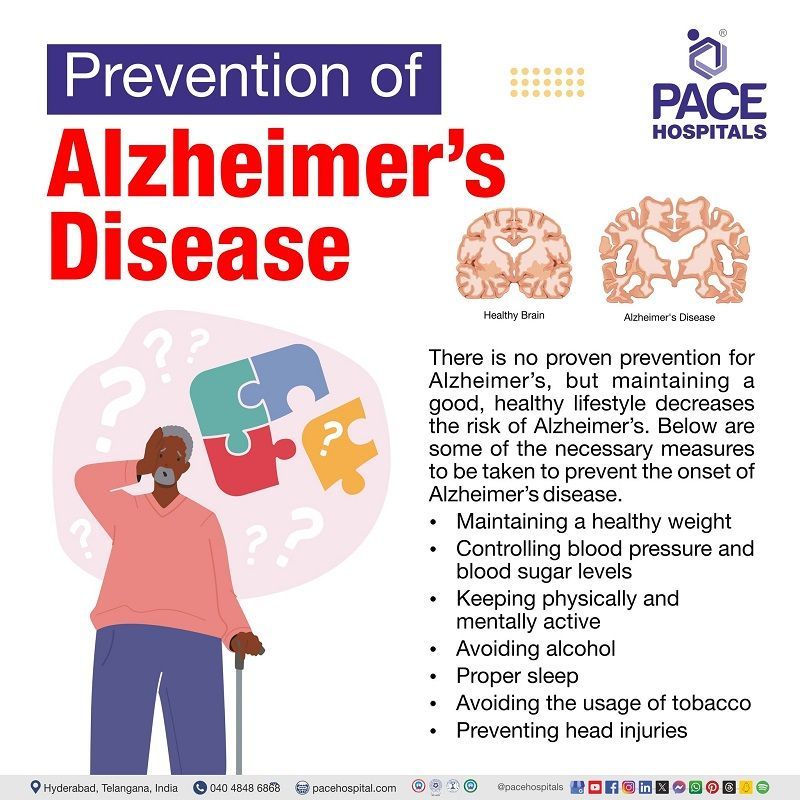
Alzheimer disease prevention
There is no proven prevention for Alzheimer’s, but maintaining a good, healthy lifestyle reduces the risk of Alzheimer’s. Below are some of the necessary measures to be taken to prevent the onset of Alzheimer’s disease:
- Maintaining a healthy weight: The risk of diabetes and heart disease is high in obese or overweight people. Maintaining a healthy weight decreases the risk of diseases.
- Controlling blood pressure: The risk of stroke increases with increased blood pressure. Lifestyle modifications like regular exercise and quitting smoking can reduce the risk of Alzheimer’s.
- Controlling blood sugar levels: Abnormal blood sugar levels lead to diabetes, which can increase the chances of stroke, heart disease, and dementia; hence, blood sugar levels must be controlled.
- Keeping physically active: A 150 minutes of moderate-intensity physical activity each week can benefit people, keep them physically active, and prevent many diseases.
- Staying mentally active: Activities that keep mentally stable must be followed, like playing games, socializing, etc.
- Avoiding alcohol: Drinking too much alcohol leads to the risk of diabetes, hypertension, and stroke. Limiting the alcohol consumption can help.
- Proper sleep: Sleeping seven to eight hours each night keeps the body and mind fit.
- Avoiding the usage of tobacco: The risk of stroke, heart attack, and lung disease can be reduced by avoiding tobacco.
- Preventing head injuries: Wearing seatbelts and helmets protects from concussions and other brain injuries.
Alzheimer’s disease diagnosis
There is no single test that confirms Alzheimer's disease. Careful assessment can help in diagnosing Alzheimer's disease. Generally, the diagnosis of Alzheimer's disease is the same as the diagnosis of other types of dementia. Besides clinical and specific laboratory and imaging tests, only histologic evaluation of brain tissue can confirm the diagnosis of Alzheimer's disease.
Here is an overview of the steps involved in diagnosing Alzheimer’s:
- Medical history
- Cognitive and neurological tests
- Lab investigations: Blood tests, lumbar puncture (To test for specific proteins in the spinal fluid)
- Imaging tests:
- Computed Tomography (CT) scan
- Magnetic Resonance Imaging (MRI)
- Single-photon emission computed tomography (SPECT)
- Positron emission tomography (PET) scans.
- Psychiatric evaluation
- Genetic tests
- Vascular tests such as head and neck magnetic resonance angiogram (MRA) or computed tomography angiogram (CTA),
- Brain tests include electroencephalogram [EEG], Cardiac tests such as electrocardiogram [ECG], echocardiography, and ambulatory cardiac rhythm monitoring.
- Beta-amyloid low levels in the (CSF) cerebrospinal fluid
- Deposits of beta-amyloid in the brain were detected by positron emission tomography (PET) scan.
Alzheimer’s disease treatment
There is no cure for Alzheimer's, but the goal of therapy is only to improve the function. Below are some of the treatment approaches:
Lifestyle modifications:
- Lifestyle modifications include proper sleep, adequate exercise, taking an anti-inflammatory diet, and avoiding stress-related activities.
- Regular exercise may benefit patients with cognitive dysfunction and older adults.
- Regular aerobic exercise (30 mins/day), along with strength training, may improve behaviour and functioning and reduce depression in Alzheimer's disease.
Nonpharmacological management of Alzheimer’s:
- Cognitive training, aromatherapy, music therapy, and massage help maintain a healthy environment.
- Behavioural techniques that can manage agitation and anxiety.
- Socialization, such as family gatherings, may be helpful in Alzheimer’s patients.
Medical management of Alzheimer’s:
- Acetylcholinesterase inhibitors
- Selective serotonin-reuptake inhibitors
- NMDA antagonists
- Antipsychotics
- Vitamin deficiencies, hypothyroidism, and depression need to be treated appropriately at therapeutic dosing.
Frequently Asked Questions (FAQs) on Alzheimer’s disease
What is Alzheimer’s disease?
Alzheimer’s disease is a brain disorder associated with progressive impairment of behavioural and cognitive functions like memory, language, comprehension, reasoning, attention, and judgment, affecting the ability to carry out the easiest tasks.
Can Alzheimer's disease be cured?
At present, there is no cure for Alzheimer's disease. However, some of the available treatments may help in managing symptoms for some time and improve the quality of life for individuals living with Alzheimer's disease.
What are the stages of Alzheimer’s disease?
Alzheimer's disease includes four stages.
1. Preclinical stage -Brain changes begins years before a person manifests any signs of the disease.
2. Mild (early stage) -Symptoms like mild forgetfulness and problems with concentration may occur in this stage, but a person may still live without any support and may have problems.
3. Moderate (middle stage)-Longest stage, usually lasting many years. Symptoms like trouble remembering events and learning new things can be seen.
4. In Severe (late stage)- A person loses the ability to walk, sit, eat, and stand and may also lose bladder and bowel control.
What are the early signs of Alzheimer's disease?
The early signs of Alzheimer's disease include:
Loss of Memory, difficulty in performing daily tasks, confusion, change in vision, frustration, misplacing things, poor judgment, mood changes, social withdrawal, and difficulty in planning and problem-solving are the first signs of Alzheimer's disease.
How to prevent Alzheimer’s disease?
There is no proven prevention for Alzheimer's, but maintaining a good, healthy lifestyle decreases the risk of Alzheimer's. Controlling blood pressure, maintaining a healthy weight, preventing head injuries, controlling blood sugar levels, treating hearing loss, and avoiding alcohol and smoking are some of the preventive measures for Alzheimer’s.
What causes Alzheimer's disease?
Age-related brain changes, combined with genetic, environmental, and lifestyle variables, cause Alzheimer's disease. An abnormal buildup of proteins (tau and amyloid) in and around brain cells eventually results in the death of the brain cells.
Is Alzheimer’s disease fatal?
At present, there is no cure for Alzheimer's disease. In advanced (later) stages, severe loss of brain function may occur and can cause malnutrition, dehydration, or infection. These complications, in turn leads to death.
What is the difference between dementia and Alzheimer’s disease?
Dementia is a clinical syndrome associated with a progressive decline in cognition, which interferes with independent functioning. Alzheimer's, a neurodegenerative disease, is the most common type of dementia, with progressive impairment of behavioural and cognitive functions.
Is Alzheimer’s disease genetically inherited?
The majority of Alzheimer's does not have a single genetic cause. Instead, it can be affected by multiple genes, lifestyle, and environmental factors. People who develop Alzheimer's do not always have a family history of the disease. But whose parents or siblings have Alzheimer’s disease they will have a greater risk of developing Alzheimer's.
How is Alzheimer’s disease diagnosed?
Unfortunately, there is no single test that confirms Alzheimer's disease. Careful assessment can help in diagnosing Alzheimer's disease. Besides clinical and specific laboratory and imaging tests, histologic evaluation of brain tissue can confirm the diagnosis of Alzheimer's disease.
Can Alzheimer’s disease be treated?
There is no cure for Alzheimer's, but the goal of therapy is only to improve the function. Proper sleep, adequate exercise, an anti-inflammatory diet, avoiding stress-related activities, cognitive training, aromatherapy, music therapy, acetylcholinesterase inhibitors, and selective serotonin-reuptake inhibitors may treat Alzheimer’s.
Who is affected by Alzheimer’s disease?
Elderly adults over 65 are more likely to develop Alzheimer's disease. Increasing age raises the chance of Alzheimer's disease. One in every fourteen,65 older individuals and one in every six older individuals were estimated to be above 80.
What happens in the brain in Alzheimer’s disease?
Alzheimer's causes damage to the neuronal connections in the brain parts involved in memory, such as the entorhinal cortex and hippocampus. Then, it affects the areas of the cerebral cortex (responsible for reasoning, language, and social behaviour). Thus, neurons are damaged and stop working normally.
How many types of Alzheimer’s disease are there?
Mainly there are two types of Alzheimer's disease one is Early-onset Alzheimer's disease, and the other is Late-onset Alzheimer's disease. Familial Alzheimer's disease (FAD) is the other type of Alzheimer's disease and comprises less than 1% of all cases of Alzheimer's.
Share on
Request an appointment
Fill in the appointment form or call us instantly to book a confirmed appointment with our super specialist at 04048486868
Appointment request - health articles
Recent Articles


